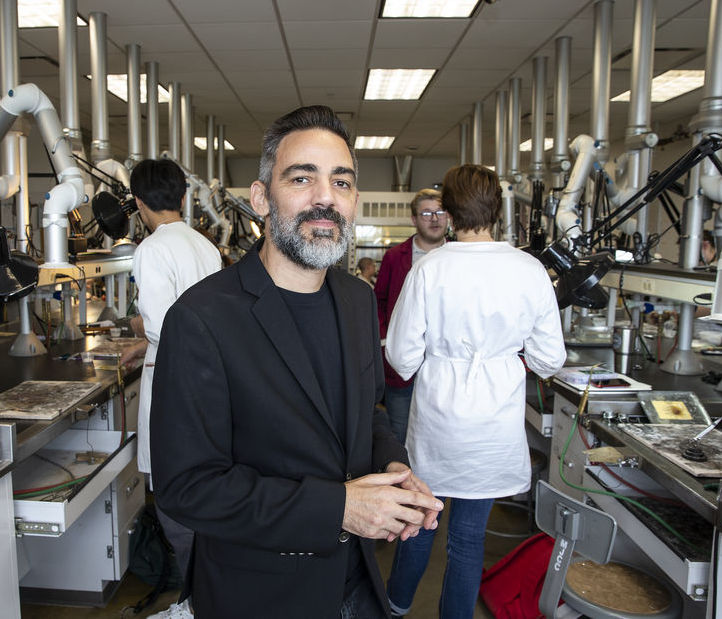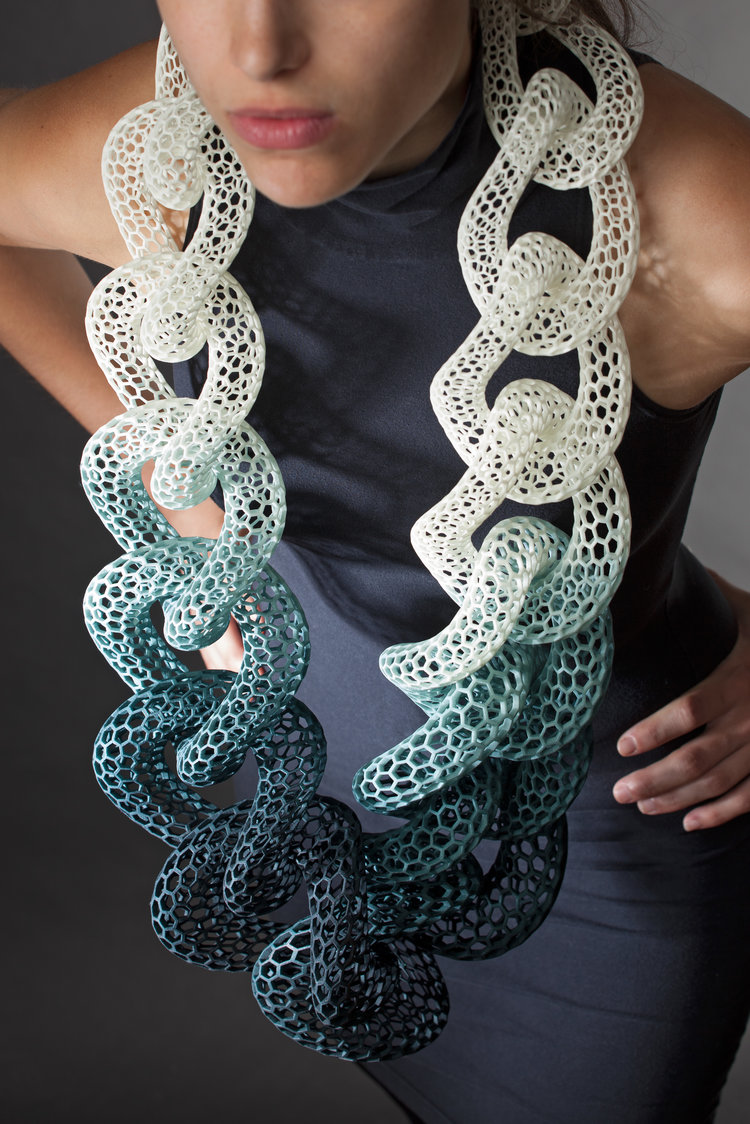Doug Bucci (MFA '99), professor and program head of Metals/Jewelry/CAD-CAM at the Tyler School of Art and Architecture, uses his lifelong struggle with diabetes to influence his innovative jewelry works, which utilize data mapping and 3D printing technologies.


Images (left to right): Doug Bucci in Tyler's expansive Metals/Jewelry/CAD-CAM facilities on Temple University's Main Campus in Philadelphia (Image: Temple Photography) and "Trans-Hematopoietic," [Black, Neckpiece, 2011, resin printed as one interlinked piece] by Doug Bucci (Image courtesy of the artist).
This story first appeared in The Temple News, by Miles Wall. You can read the original article here.
As a child, Doug Bucci (MFA '99), assistant professor of instruction and program head of the Metals/Jewelry/CAD-CAM Program at the Tyler School of Art and Architecture, spent a year at the Children’s Hospital of Philadelphia for diabetes treatment. He recalled how he fashioned spare caps of his insulin bottles into beads for necklaces.
Now, as the leader of Tyler Metals/Jewelry/CAD-CAM, Bucci has continued to wield unlikely inspiration from diabetes into his work but in a more high-tech fashion.
Bucci spoke to a crowd of Temple alumni at the university’s Center City campus on January 22, 2020 for "Thinking Organically," a discussion about how he uses data visualization, digital modeling and 3D-printing technologies to make innovative art about disease.
“My system involves looking at the way technology begins to drive change. I’m no longer dealing with ‘this,’” Bucci said, gesturing to his hands. “My work is now driven by the apparatus that I wear.”
That apparatus, which Bucci said includes an insulin pump and a “continuous glucose monitoring system,” exchanges information through radio frequency. Bucci realized he could harness this frequency to collect data, charting the ebbs and flows of his blood sugar, he said.
He can model that data visually with 3D-rendering software to create a collection of unique, precisely shaped digital objects. These objects can then be 3D-printed from a file to create jewelry or other pieces.
Bucci said he was first inspired to bring his personal health into his art during his time as a student at Tyler when a professor encouraged him to look to his closest instincts to guide him as an artist.
“I think that really began to plot my trajectory,” Bucci said. “What I knew best was me, my health, my day-to-day life. What I put into my body, what came out of my body, what I wanted to do and what I was most afraid of.”
Bucci discussed how those aspects came together in one of his pieces titled “Transmet,” a brooch shaped like part of a severed foot. Bucci said the piece was inspired by a conversation he had with a fellow diabetic about their shared fear of needing to get a limb amputated, one possible result of complications related to the disease.
“Jewelry is a wonderful vehicle,” Bucci said. “We wear jewelry out into the world and it’s a messenger, right? We could wear a brooch, we could wear a neckpiece, we could wear earrings and we can engage someone in conversation around that piece.”
Larry and Heidi Becker, alumni of Tyler, attended the event together after reading about it in an alumni newsletter. Together, the couple owns and runs Larry Becker Contemporary Art, a gallery in Old City between 2nd and Cuthbert streets.
Bucci’s motivations were distinct from those of many other artists, Larry Becker (MFA '71) said.
“We’ve worked with a lot of abstract painters and the source of their inspiration is the subject of painting. It doesn’t seem to come from their personal need to identify who they are and he did. He’s really identifying who he is through issues that he has,” Larry Becker said.
“He took those two powerful forces and turned them into something that is not only helping him and putting something new into the world that was never here before but also helping other people by what he’s doing,” said Heidi Becker.